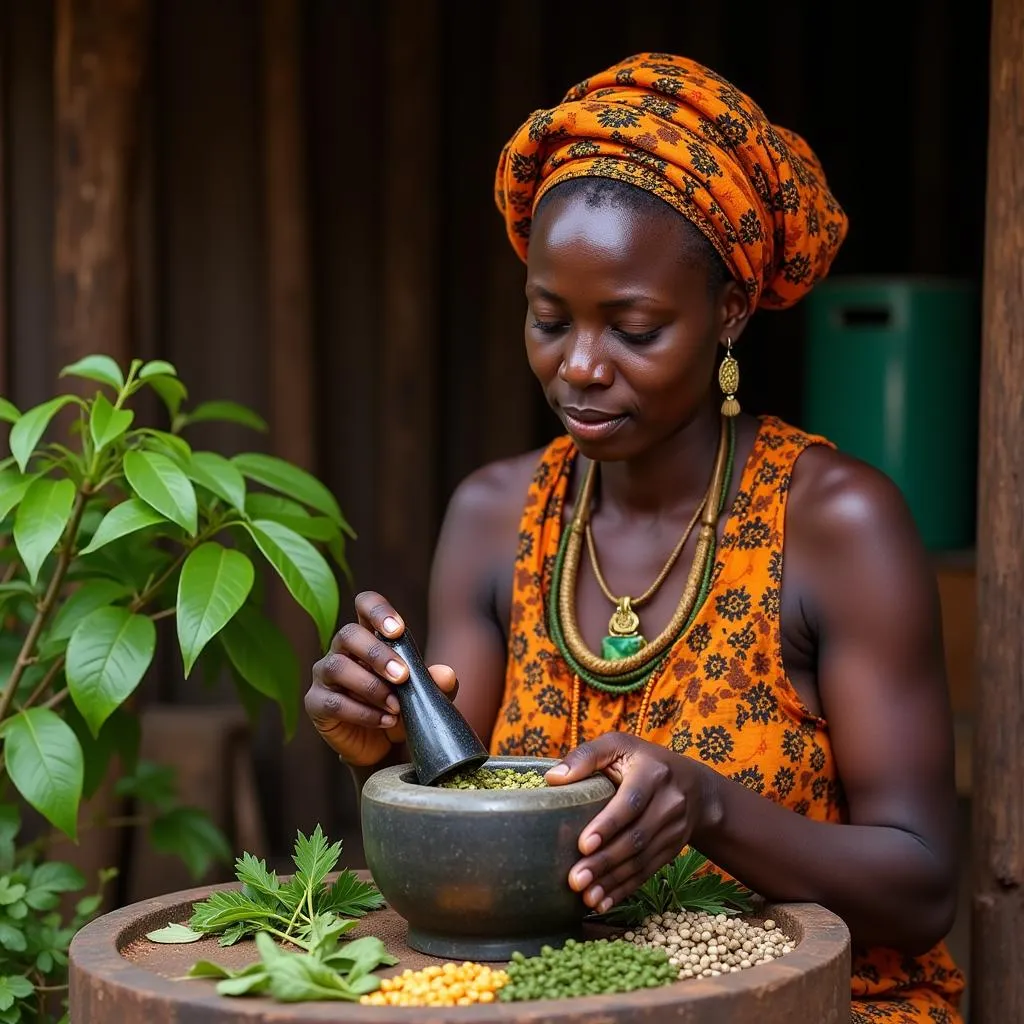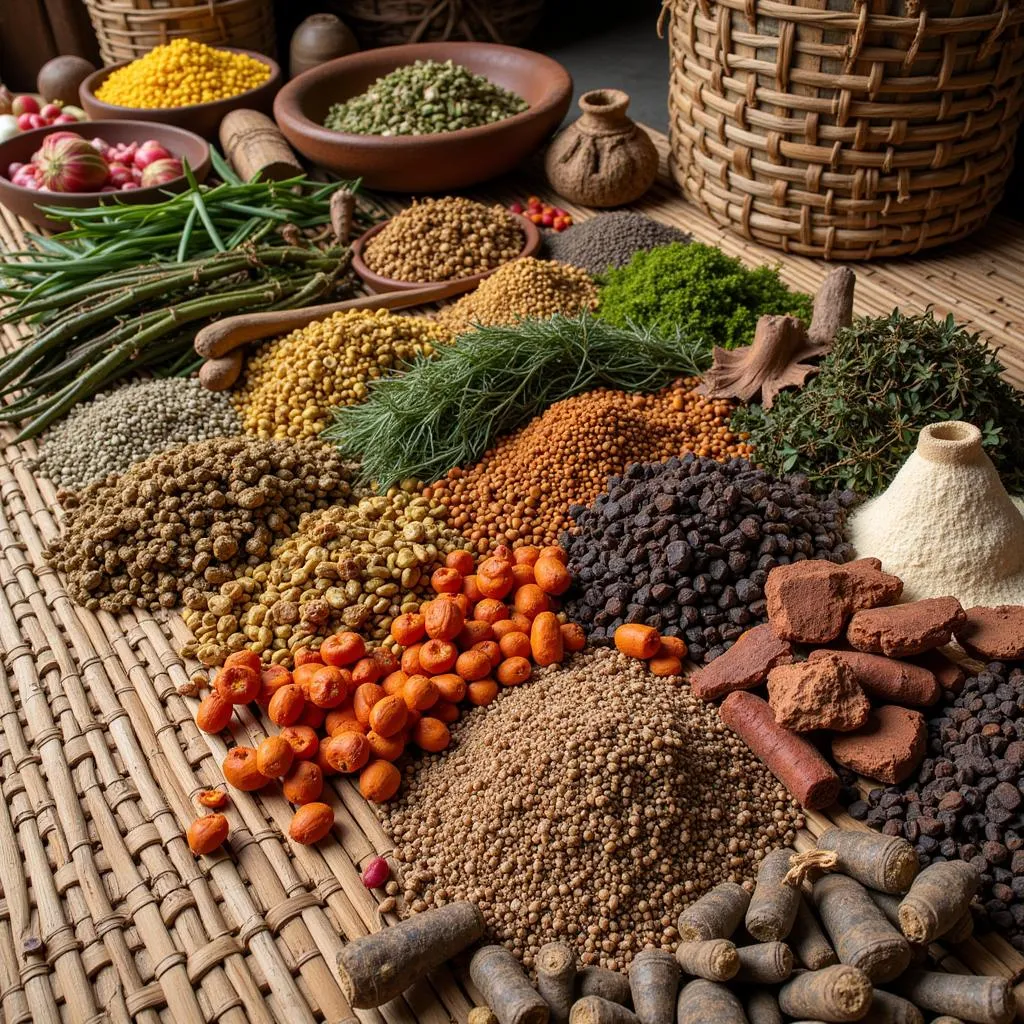Exploring Traditional African Sex Medicine: Myths, Realities, and Ethical Considerations
The term “African Sex Medicine” often evokes curiosity and raises eyebrows. It conjures images of ancient rituals, mysterious herbs, and perhaps even questionable claims. While it’s true that Africa has a rich history of traditional medicine, addressing sexual health concerns included, it’s essential to approach this topic with sensitivity, respect, and a critical eye. This article delves into the world of traditional African sex medicine, separating fact from fiction, exploring its cultural significance, and examining the ethical implications surrounding its use.
 African Traditional Healer
African Traditional Healer
A Holistic Approach to Sexual Health
In many African cultures, sexual health isn’t merely about physicality; it’s deeply interwoven with spiritual, emotional, and social well-being. Traditional healers, often revered figures within their communities, approach sexual health from this holistic perspective. They address a wide range of concerns, from infertility and menstrual irregularities to low libido and erectile dysfunction.
Traditional African medicine often emphasizes restoring balance and harmony within the body and soul. Treatments may involve a combination of herbal remedies, dietary adjustments, spiritual practices, and lifestyle changes. This holistic approach, while different from Western medicine, reflects a deep understanding of the interconnectedness of the human experience.
The Power of Plants: African Herbs and Their Uses
Africa boasts incredible biodiversity, and its diverse flora plays a crucial role in traditional medicine. Many plants possess medicinal properties and have been used for centuries to address various ailments, including those related to sexual health.
For instance, some herbs are believed to enhance libido and improve sexual performance. Others are used to treat sexually transmitted infections, address hormonal imbalances, or support reproductive health. It’s important to note that while anecdotal evidence often supports these traditional uses, scientific research on the efficacy and safety of many African herbs is still ongoing.
 African Herbs and Roots on Display
African Herbs and Roots on Display
Navigating Myths and Misconceptions
The world of traditional African sex medicine is not without its share of myths and misconceptions. Sensationalized stories and exaggerated claims often overshadow the nuanced reality. One common misconception is that certain animal parts, like african buffalo horns, possess magical properties that can enhance virility. These beliefs often stem from cultural symbolism and ancient traditions but lack scientific backing.
Another area rife with misinformation is the use of aphrodisiacs. While some African herbs are traditionally believed to have libido-boosting properties, their effectiveness can vary greatly depending on factors like dosage, preparation, and individual responses. It’s crucial to approach such claims with a healthy dose of skepticism and consult with qualified healthcare professionals for accurate information.
Ethical Considerations and Cultural Sensitivity
When discussing traditional African sex medicine, it’s paramount to approach the topic with cultural sensitivity and respect. Practices that might seem unusual or even controversial to outsiders often hold deep cultural and spiritual significance for those who practice them.
Furthermore, it’s essential to be aware of the ethical implications surrounding the use of animal parts in traditional medicine. The demand for certain animal products has, in some cases, contributed to poaching and illegal wildlife trade, posing a severe threat to endangered species. Sustainable and ethical harvesting practices are crucial to preserving both biodiversity and cultural traditions.
Bridging the Gap: Integrating Traditional and Modern Medicine
While traditional African medicine plays a vital role in many communities, it’s not meant to replace modern healthcare. Integrating traditional knowledge with scientific advancements can lead to a more comprehensive and holistic approach to sexual health.
For instance, researchers are exploring the potential of isolating active compounds from traditional herbs to develop new drugs or therapies. This collaborative approach can help unlock the potential of African medicinal plants while ensuring safety and efficacy.
 Modern Healthcare Consultation
Modern Healthcare Consultation
Conclusion: A Call for Respect, Research, and Responsible Use
Traditional African sex medicine is a complex and multifaceted subject. While it’s essential to acknowledge its cultural significance and potential benefits, it’s equally crucial to approach it with a discerning mind, separating fact from fiction and prioritizing ethical considerations.
Further research is needed to validate traditional uses, understand potential risks, and explore the possibilities of integrating traditional knowledge with modern medicine. By embracing a balanced and informed perspective, we can appreciate the rich history of African traditional healing practices while ensuring their responsible and sustainable use.
FAQ
1. Is traditional African sex medicine safe?
The safety of traditional African sex medicine varies greatly depending on the specific herbs and practices involved. It’s crucial to consult with a qualified traditional healer or healthcare professional before using any traditional remedies, especially if you have pre-existing medical conditions or are taking other medications.
2. Are there any proven aphrodisiacs in African traditional medicine?
While some African herbs have a long history of use as aphrodisiacs, scientific evidence supporting their effectiveness is often limited. More research is needed to understand their potential benefits and risks.
3. Can traditional African medicine cure sexually transmitted infections (STIs)?
It’s crucial to seek medical attention for diagnosing and treating STIs. Traditional remedies may help manage symptoms, but they should not be used as a substitute for evidence-based medical treatment.
4. What are the ethical concerns surrounding traditional African sex medicine?
Some practices, particularly those involving the use of endangered animal parts, raise ethical concerns about sustainability and animal welfare. It’s crucial to prioritize conservation efforts and seek alternative solutions when possible.
5. How can I learn more about traditional African medicine for sexual health?
Reputable sources of information include academic journals, books by ethnobotanists and anthropologists, and organizations dedicated to researching and preserving traditional knowledge.
Do you have other questions?
Explore these related articles on our website:
- African girl massage hyderabad
- African herbs for blocked fallopian tubes
- African fly testosterone
- African black ant capsules
For personalized guidance and support regarding traditional African medicine and sexual health, reach out to us!
Contact us:
Phone: +255768904061
Email: kaka.mag@gmail.com
Address: Mbarali DC Mawindi, Kangaga, Tanzania
Our dedicated customer support team is available 24/7 to assist you.
